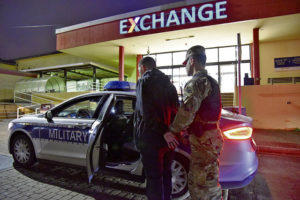
The holiday season is typically the busiest shopping period of the year. For some people, it’s about buying the best deals on the shelf. For others, it’s about taking the best steals off the shelf.

Although there are several reasons why people shoplift, it is difficult to pinpoint their primary motives, said Rickey Anderson, U.S. Army Garrison Rheinland-Pfalz Civilian Misconduct Officer for the Baumholder Military Community.
“There are so many different reasons why people steal. For example, some offenders may shoplift to see if they can get away with it or do it as a way to challenge authority. Others may do it because their friends shoplift,” he explained. “There are also some who may shoplift for the thrill — to satisfy their urge for excitement and gain a sense of victory when they do so.”
Approximately $9,461 worth of merchandise was stolen from the Kaiserslautern Military Community Center Base Exchange last year, said Ken Randell, Army Air Force Exchange Service Loss Prevention manager.
“Last year a total of 54 shoplifters were caught removing merchandise from the Exchange without rendering payment,” said Randell, who has 23 years of experience in the loss prevention field. “In most cases, peer pressure plays a role with students attempting to get away with removing merchandise without rendering payment. Other situations may involve not having the money due to budget constraints.”
Regardless of why people shoplift, it’s an issue that USAG RP Civilian Misconduct takes seriously. Under the USAG RP Civilian Misconduct Action Authority Program, and in accordance with Army in Europe Regulation 27-9, those caught shoplifting at AAFES facilities will have their AAFES privileges temporarily suspended for a period of one year (this happens at the time of the offense) or until adjudicated by the CMAA. This period of suspension can be reduced if individuals attend directed counseling and participate in the USAG RP Community Service Program. The amount of participation in the program will be dependent on the estimated cost of property involved in the larceny and the age and maturity of the offender.
Restoration of privileges is not automatic and must be requested through the USAG RP Civilian Misconduct Office and approved by the CMAA. Individuals must complete counseling prior to the restoration of privileges and pay a recovery fee.
“It’s a privilege to serve U.S. Forces overseas, whether as a civilian employee or contractor,” said Robert Leist, Acting Civilian Misconduct Program manager for USAG RP and Installation Management Command — Europe. “Additionally, it is a privilege for family-member dependents of one of our service members or civilian employees to live overseas with them during their tour.”
When people are caught shoplifting, they are apprehended by security forces and processed at the station, Randell said.
“This situation carries a degree of embarrassment for the offender and sponsor of the individual. The Exchange has a Congressionally Mandated Program called, ‘Civil Recovery,’ which is a request for a $200 administrative fee as an additional cost for the incident,” he explained. “This amount is in addition to the cost of the merchandise that was removed from the facility without rendering payment. Their command could also suspend their shopping privileges.”
One major consideration for civilian employees is how shoplifting might negatively impact their security clearance and ability to perform required duties, Leist said.
“It is possible for employees to face disciplinary action, up to and including removal from employment for off-duty misconduct while serving overseas. Individuals involved with law enforcement authorities of a host-nation government negatively reflect upon the United States and affect the success of its mission overseas. The ultimate decision for removal is up to the employee’s management,” he said.
Dependent family members could face an Early Return of Dependent wherein the family member(s) involved in misconduct can be returned to the continental United States. Additional possibilities might include the ERD of an entire family if necessary or even the curtailment of the sponsor’s tour in Germany if there is not a well-established family care plan to address the individual’s return to CONUS.
In fiscal 2018, there were 23 cases of shoplifting in the Rheinland-Pfalz region involving Army civilians and dependents and juvenile shoplifting was down 60 percent. Although these numbers may seem promising, there is still a lot work to be done, Anderson said.
“What must be understood is that civilians accompanying U.S. Forces overseas are allowed to remain here on the condition of good behavior. Permission for a civilian to reside with a sponsor is agreed upon in the Status of Forces Agreement,” he explained. “When civilians fail to live up to their end of the agreement, the CMAA can implement adverse administrative sanctions in response to their misconduct.”
The purpose of providing this information, Randell said, is to raise awareness in the community of the consequences if offenders are caught shoplifting.
“Hopefully, this information will serve as a deterrent and encourage people to make good decisions and not be involved in theft activity in the future. The consequences are tough and at the end of the day, it’s just not worth it,” he said.
There are always underlying reasons for these types of crimes, Leist said, and during this holiday season, we need to ensure everyone knows there are multiple agencies here in our military community to assist and care for their well-being.
“We have a wealth of resources to assist those who are struggling, who are in need – whether financially, mentally and/or emotionally. Our children have Adolescent Support and Counseling Services counselors in their schools, and our employees have the Employee Assistance Program to provide assistance,” Leist concluded. “Also available are Military and Family Life Counselors, school counselors, behavioral health professionals, chaplains, etc. The bottom line is — if someone needs help, there are agencies to help them. If someone sees a friend, colleague or family member struggling — reach out to get them the assistance they need.”


